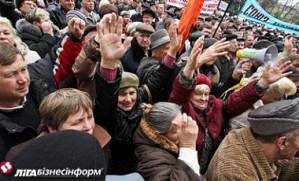Can you really achieve nothing by protesting?
The Centre for Society Research writes that it is taking time during the relative lull in protest activities due to the New Year and Christmas break to summarize positive trends and consider any victories during the period from October to December 2011
The government had planned to adopt draft bill No. 9127 On State Guarantees for Enforcement of Court Rulings, which would have deprived 16 groups in society of benefits, including former Chornobyl clean-up workers, Afghanistan War veterans and children of the War. Protests began in different parts of the country and developed into a many-thousand strong demonstration outside the Verkhovna Rada on 20 September. This included an attempt to break down the fencing and storm parliament.
The draft bill was withdrawn on 20 October.
However the battle over social benefits was only just beginning. During November there were protests throughout the country, especially by former Chornobyl clean-up workers. The Centre mentions that on 29 November the Cabinet of Ministers announced an increase in pensions. This was two days after the death of Gennady Konovalyov, one of the people on hunger strike outside the Pension Fund in Donetsk who died when police and (apparently) Emergencies Ministry men stormed and forcibly dismantled the protesters’ tents.
While some nominal concessions were made, it would seem premature to speak of victories with regard to social benefits in general, and the former Chornobyl clean-up workers in particular. The substantive issues remain, including that of unenforced court rulings which ordered the authorities to pay people pensions and benefits owed them by law. Please see Chornobyl’s Ongoing Victims and the texts underneath for more details about some of the methods used by the authorities, including the use of police and criminal investigations against certain protesters.
There is also the judgement, reflecting a fundamental change in position, from the Constitutional Court on 27 December declaring it constitutional for the Cabinet of Ministers to be allowed to determine the size of social payments depending on the financial resources available.
There were other achievements, the Centre notes.
In February 2011 Vets had been prohibited from using any narcotic substances effectively meaning that they could not give medication to relieve pain. There were protests and strikes which finally led to the Verkhovna Rada effectively removing it’s ban on 1 November 2011.
Students of the Kyiv Polytechnic protested in October against attempts by the Education Ministry to replace the Dean, Mykhailo Zhruovsky who had publicly criticized the work of the Ministry. Following student protests the Ministry backed down and on 2 November the order to renew Mr Zhubrovsky’s contract was signed.
Following protests over the cancellation by the Verkhovna Rada of quotas on Ukrainian music in music programmes and audiovisual production from 50% to 25% in November, a statement was made promising to review the law. It remains, of course, to be seen whether this review makes any significant changes.
There have also been a number of protests against construction work as well as by workers over wage arrears, etc. It says that such protests are most often successful.
Much reduced from a report at http://[email protected] The comments above in italic are from the translator






